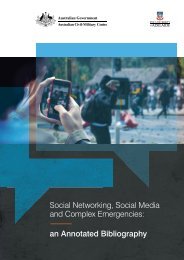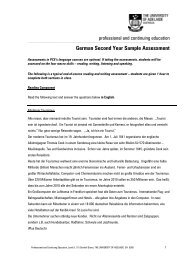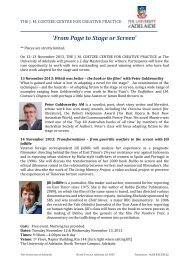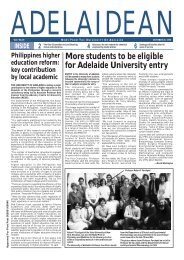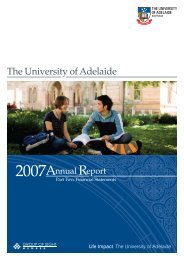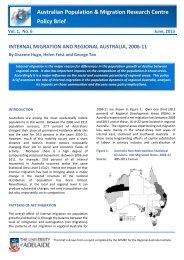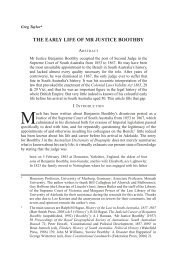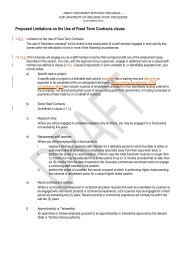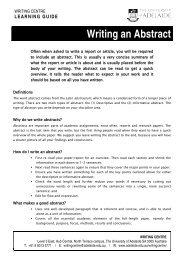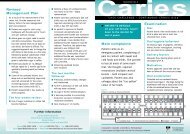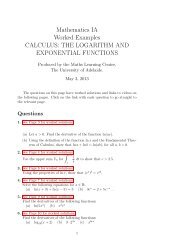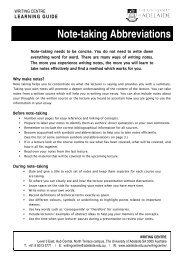Unbridling the Tongues of Women - The University of Adelaide
Unbridling the Tongues of Women - The University of Adelaide
Unbridling the Tongues of Women - The University of Adelaide
Create successful ePaper yourself
Turn your PDF publications into a flip-book with our unique Google optimized e-Paper software.
<strong>Unbridling</strong> <strong>the</strong> tongues <strong>of</strong> women<br />
Spence did not seek this distinction but she did seize <strong>the</strong> opportunity when it<br />
was presented to her. One day in 1878, Woods was ill, and <strong>the</strong>re was no layman<br />
available to take <strong>the</strong> service. Spence had, some seven years earlier, given two lectures<br />
to <strong>the</strong> South Australian Institute, so <strong>the</strong> congregation knew that she was capable <strong>of</strong><br />
speaking in at least a semi-public forum. Some <strong>of</strong> its members suggested that Miss<br />
Spence might step into <strong>the</strong> breach by reading one <strong>of</strong> James Martineau’s sermons. She<br />
complied, and followed that up by <strong>of</strong>fering to preach a sermon <strong>of</strong> her own. On 24<br />
November 1878 she preached an original sermon in <strong>the</strong> Wakefield Street pulpit for<br />
<strong>the</strong> first time. A dream fulfilled? Spence’s own account would suggest a happy circumstance<br />
ra<strong>the</strong>r than an aspiration realised. But it is difficult to forget Clara Morison<br />
scribbling in her journal. Spence knew <strong>the</strong> power attached to <strong>the</strong> pulpit in her<br />
society; she could not have been unaware <strong>of</strong> <strong>the</strong> symbolic power, both for herself and<br />
for that society, <strong>of</strong> her presence – a woman’s – in it. Once started she never looked<br />
back. In her autobiography she reported, ‘I suppose I have preached more than a<br />
hundred times in my life, mostly in <strong>the</strong> Wakefield Street pulpit; but in Melbourne<br />
and Sydney I am always asked for help; and when I went to America in 1893-94 I<br />
was <strong>of</strong>fered seven pulpits’. 60<br />
Preaching gave her great pleasure. She recalled, ‘<strong>The</strong> preparation <strong>of</strong> my sermons<br />
… has always been a joy and a delight to me, for I prefer that my subjects as<br />
well as <strong>the</strong>ir treatment shall be as humanly helpful as it is possible to make <strong>the</strong>m’.<br />
<strong>The</strong>y enabled her to make use <strong>of</strong> <strong>the</strong> wide knowledge <strong>of</strong> scripture which Miss<br />
Phinn had commended. She could express in <strong>the</strong>m <strong>the</strong> ideas she drew from her<br />
wide reading. She preached on <strong>the</strong> parallels between different branches <strong>of</strong> Buddhism<br />
and <strong>the</strong> congregational and hierarchical Christian churches, on Lu<strong>the</strong>r, on<br />
Milton’s unjust concept <strong>of</strong> God in Paradise Lost, and on Tolstoy as a prophet. She<br />
could exhort <strong>the</strong> congregation to pursue each new reform that caught her attention.<br />
She preached on <strong>the</strong> merits <strong>of</strong> <strong>the</strong> work <strong>of</strong> William Booth and <strong>the</strong> Salvation<br />
Army, and on child welfare in Britain. She could expound her own views on <strong>the</strong><br />
best attitudes and virtues to be developed: she preached recognition that Jews<br />
– who were, she announced with unquestioning prejudice, all capitalists – were<br />
also a pro-liberal influence in politics because <strong>the</strong>y had always been oppressed;<br />
she preached that ‘Experience is an education and not a snare’; she preached that<br />
‘meliorism’, ra<strong>the</strong>r than optimism or pessimism, was <strong>the</strong> attitude that would assist<br />
human progress most. Moreover, in Unitarian congregations, she could expect<br />
a sympa<strong>the</strong>tic hearing when she protested against traditions that repressed indi-<br />
74



